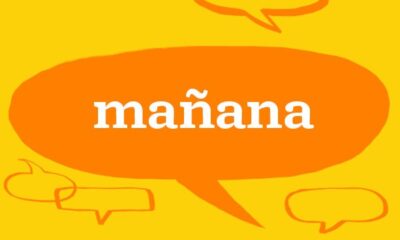Texting in Spanish
Texting in Spanish is based on the same premise as texting in English, in that the aim is to convey the desired message as concisely and quickly as possible. To do this – and to achieve the holy grail of using a minimum of characters – both languages use abbreviations and phonetic approximations to get the meaning across.

Spanish texting abbreviations
We can abbreviate a word as far as we dare without its meaning getting lost, usually by ditching unnecessary vowels. The shortened ‘uni’ is handy in both languages to express ‘university’ / ‘universidad’, but other abbreviations are language-specific: saying that you’re doing your shopping in a ‘sprmrkt’ is understandable in English, as is a ‘tnda’ (una tienda – ‘a shop’) in Spanish.
Using Spanish sounds in texting
Both languages are helped by complete words sounding like an individual letter. Just as the English ‘you’ is expressed perfectly well as ‘u’, so the Spanish te can be reduced to ‘t’ and de to ‘d’. With certain words, we can make short sentences with a minimum of characters: ‘cu’ (‘see you’) or ‘tbo’ (te veo – ‘I see you’).
Other shortened forms in both languages use a combination of phonetics and vowel-crunching: ‘r u cmg’ (‘are you coming?’) and ‘q hcs’ (¿qué haces? – ‘what are you doing?’). The English texting question word ‘wot’ is even more concise when you’re texting in Spanish: ‘q’ is sufficient to express ¿qué?, but it’s increasingly common among young people to use ‘k’ instead. This signals an awareness, across the Spanish-texting world, of English sounds and words – i.e. it’s known that the English letter ‘k’ sounds a bit like the Spanish ¿qué?. English terms are also widely used in this form of Spanish: ‘ok’, ‘pls’ (‘please’, alongside other variants of por favor such as ‘xfa’ and ‘pf’) and ‘2’ (for the Spanish tú or tu).
Using numbers in Spanish texting
As can be seen in the last example above, the incorporation of numbers can be very useful, too: ‘m8’ for ‘mate’ in English, and examples like ‘d2’ for dedos (‘fingers’) or ‘salu2‘ (saludos – ‘greetings’) in Spanish. The English 2, 4 and 8 are particularly useful in this respect, as are the Spanish 1 and 2. The Spanish indefinite articles un and una overlap with numerical usage for ‘one’, so you can easily say ‘qt1bd’ (que tengas un buen día – ‘have a good day’) or ‘m1ml’ (mándame un mensaje luego – ‘send me a message later’).
These latter examples are the ultimate in abbreviation: where a shortened version of a phrase is so widely known that just the initials will do. Think of the English ‘lol’ (‘laugh out loud’), ‘ttfn’ (‘ta-ta for now’) or ‘gsoh’ (‘good sense of humour’). Spanish can offer ‘nls’ (no lo sé – ‘I don’t know’), ‘npn’ (no pasa nada – ‘no problem’), ‘tqi’ (tengo que irme – ‘I have to go’) and ‘nph’ (no puedo hablar – ‘I can’t talk right now’). If you know your correspondent a bit better, then how about ‘tq’ (te quiero – ‘I love you’)?
‘OK?’
‘hl’ (‘hasta luego’) – ‘cu l8r’
Useful Spanish text message abbreviations
t = te (you)
d = de (of)
pf / xfa = por favor (please)
2 = tú (you) / tu (your)
tbo = te veo (I see you)
q / k = ¿qué? (what?)
q hcs = ¿qué haces? (what are you doing?)
d2 = dedos (fingers)
hl = hasta luego (see you later)
salu2 = saludos (greetings)
qt1bd = que tengas un buen día (have a good day)
m1ml = mándame un mensaje luego (send me a message later)
nls = no lo sé (I don’t know)
npn = no pasa nada (no problem)
tqi = tengo que irme (I have to go)
nph = no puedo hablar (I can’t talk right now)
tq = te quiero (I love you)



